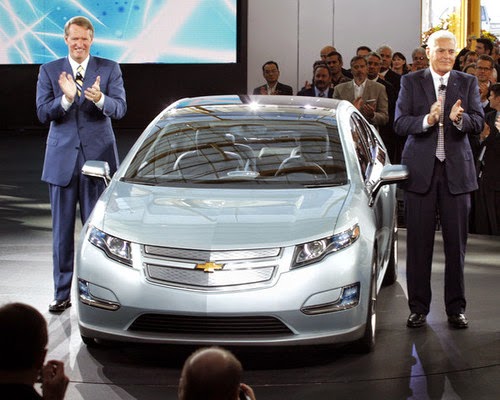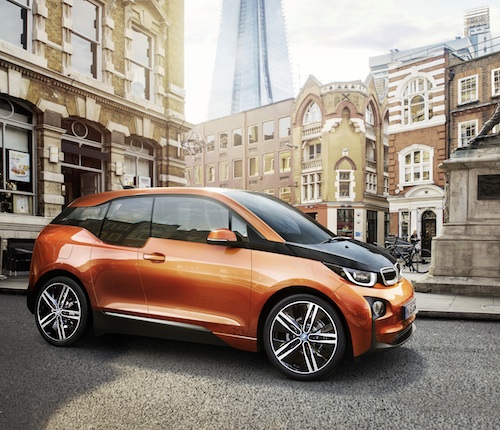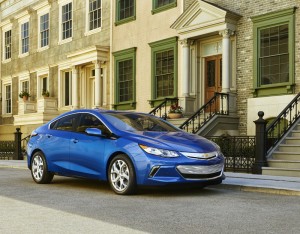A piece of news has come which could cheer anti-electric-car “Conservatives” — GM is ending production of the Chevy Volt. But the actual reason for ending Volt production isn’t what those so-called-Conservatives had predicted. Instead of the Volt being a dismal flop (it’s not, quite), GM is stopping Volt production to retool the factory and sell off existing Volt inventory.
Back in 2011 and 2012 the news was full of anti-Volt bashing from Conservatives in the U.S. and their favorite news outlet, Fox News. For example connecting the Volt to Solyndra as another waste of taxpayer money, making stupid boasts that the Volt wouldn’t fit in with Georgia’s needs because it can’t carry a gun rack, the generalized bashing of the Volt, and the idea that the Volt is a rolling firebomb that could blow up at any time.
What’s happened since? Until the BMW i3 came along there was a three-way contest between sales of the Chevy Volt, Nissan Leaf, and Tesla Model S. For a while the sales leader between the Leaf and Volt switched back and forth, and it even looked like the Leaf might be the dismal flop just before the 2013 Leaf went on sale. But for the last year or more Volt sales have been stagnant (or even declining a bit) while the Leaf, Model S, and now the BMW i3, are firmly in the lead of electric car sales. The Fiat 500e even had a surprising sales burst in March 2015.
In 2014 the Volt was the #2 electric car (er.. car that can be plugged in) in the U.S. but the Leaf sold nearly twice as many cars as the Volt (30,200 Leafs to 18,805 Volt’s). There were 17,300 Model S’s sold, 13,264 Prius Plug-in’s, 13,264 Ford Fusion Energi’s, and so on. In other words, the Volt was firmly in #2 with the Model S quickly gaining.
So far in 2015 the Volt has dropped to the #5 spot in sales, with the ranking being Tesla Model S, Nissan Leaf, BMW i3, and Fiat 500e making up the top four.
Total U.S. Leaf sales recently surpassed total U.S. Volt sales.
As an aside – Ford’s sales of the Fusion Energi and C-MAX Energi should be lumped together, in my opinion. If so, combined they’ve sold about 3,500 units so far in 2015 putting the Energi’s in the #3 spot behind the Nissan Leaf.
Getting back to the Volt, it’s sales per month in 2015 are about 1/3rd what they were in 2014. What happened?
GM announced the 2nd generation Volt in January 2015. It’s so much better than the current Volt that buyers are probably saying “hmm.. I’ll wait a few months”.
According to a news report on MarketWatch![]() , Volt production will end “early next month” – going by the date on the article, that’s early May 2015. According to current news reports, the 2nd generation Volt is in “pre-production” and the MarketWatch report says that GM is on track for full production at the end of the summer, 2015.
, Volt production will end “early next month” – going by the date on the article, that’s early May 2015. According to current news reports, the 2nd generation Volt is in “pre-production” and the MarketWatch report says that GM is on track for full production at the end of the summer, 2015.
That means a 2-3 month production hiatus for the Chevy Volt.
The Volt’s weak sales, which really began in mid-2014, have surely meant there’s an excess supply of unsold Volts. The MarketWatch report says there’s a seven month supply. Therefore GM needs to do something. Selling seven months worth of Volt’s in 2-3 months doesn’t seem too likely, unless GM also lowers the price somehow.
Is there a deeper problem here?
Back in August 2013 I wrote about how the Volt might run into trouble because of competition it’s facing from the Model S, the Nissan Leaf and the BMW i3. A prediction that seems to have come true. In May 2014, with Volt sales starting to look bleak GM tried to paint a pretty face on that situation. The issues have been a combination of poor marketing efforts by GM, dealers who are working against the Volt, and GM’s difficulty in portraying the Volt to customers.
That, and GM’s pigeon-holing the Chevy Spark EV as an obvious compliance car, made me think in May 2014 that GM just isn’t serious about electrified vehicles.
With the Bolt going on sale in 2016 (200+ mile range) and the Gen2 Volt going on sale later this year, we might see more seriousness from GM. Is there any sign GM is ramping up marketing of the Volt? What about all the dealers who rebel against selling the Volt?
As for the difficulty in portraying the Volt, GM insists on calling it an electric car with extended range. GM needs to stop doing that because it’s confusing people. The Volt is a plug-in hybrid. Hybrid vehicles have two (or more) power sources – the Volt has both a gasoline engine and electric motor – and combines them to drive the vehicle. Even a serial hybrid, where the gas engine purely charges the battery pack, is called a hybrid vehicle. That the Volt can be plugged in to recharge the pack makes it a plug-in hybrid.
The MarketWatch report quotes GM’s Chevrolet Car Marketing Director Steve Majoros as saying the marketing plan is coming together, that “GM plans to address the confusion around a battery-powered car that has a gasoline engine”, and that Dealers will get significant support for the 2016 model, and that GM will be “out publicly and big.”
I’m sure they didn’t mean to say the Volt will be having a Coming Out party. Instead that GM will be advertising the Volt “publicly and big”.
Sales of the Toyota Prius didn’t take off until the 2nd generation model.
- The USA should delete Musk from power, Instead of deleting whole agencies as he demands - February 14, 2025
- Elon Musk, fiduciary duties, his six companies PLUS his political activities - February 10, 2025
- Is there enough Grid Capacity for Hydrogen Fuel Cell or Battery Electric cars? - April 23, 2023
- Is Tesla finagling to grab federal NEVI dollars for Supercharger network? - November 15, 2022
- Tesla announces the North American Charging Standard charging connector - November 11, 2022
- Lightning Motorcycles adopts Silicon battery, 5 minute charge time gives 135 miles range - November 9, 2022
- Tesla Autopilot under US Dept of Transportation scrutiny - June 13, 2022
- Spectacular CNG bus fire misrepresented as EV bus fire - April 21, 2022
- Moldova, Ukraine, Georgia, Russia, and the European Energy Crisis - December 21, 2021
- Li-Bridge leading the USA across lithium battery chasm - October 29, 2021





















GM could help Volt resale value and increase sales of 2015 Volts if they simply did what Tesla did: Tell people they can upgrade to a battery of higher capacity in the future.
This article has some interesting information but is tainted by some problems.
The author spends the first two paragraphs insulting all conservatives, rather embracing potential advocates. I’m a conservative, and am very interested in getting an electric vehicle. It’s good to know I’m not welcome here so that I can avoid this site in the future.
Then he uses language like “anti-Volt bashing” which means the opposite of what is intended, and misuse the word “awhile” (rather than using “a while”), making me think that editors are not used here. This may seem obnoxious and nitpicky, but if one wants to be taken seriously as a writer, they need to show correct writing.
And to top it off, he advocates for calling the Volt a hybrid, although it is markedly different from other hybrids on the market in a huge way, and would cause greater confusion if they lumped it in with the Prius and similar vehicles. The difference? The Volt can run on 100% electric, as long as the battery is charged. The gas is only used as a “ranged extender” when the battery is depleted. That functionality is completely different from what the market is currently calling “hybrids”, and range extended makes perfect logical sense.
@Robert – I did not complain about all Conservatives – but certain people who claim to be Conservative but whose agenda is to promote certain industries (oil dependency) over others. There clearly HAS been lots of anti-Volt bashing over the years. The Volt is a Plug-in Hybrid, as I said, for the reasons I said. GM is creating confusion by insisting on calling it something it’s not and creating new labels that didn’t exist before.
Pingback: The 200+ mile range $35k EV competition, is Tesla still out in front? | The Long Tail Pipe